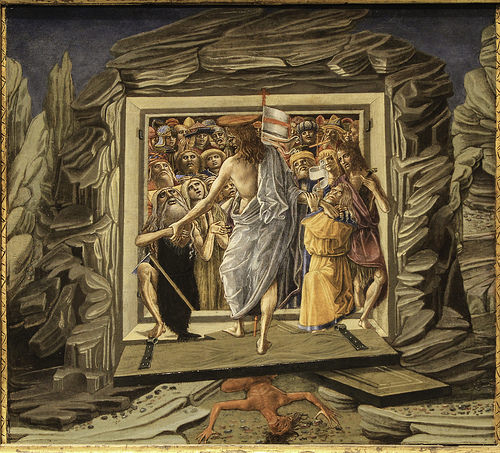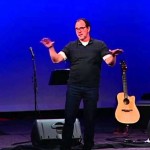We run our website the way we wished the whole internet worked: we provide high quality original content with no ads. We are funded solely by your direct support. Please consider supporting this project.

What Happened on the Cross?
Since the time of Anselm (11th century), and especially since the Reformation in the 16th century, the tendency of the Western church has been to focus almost all of its attention on the anthropological dimension of the atonement, usually to the neglect of the cosmic dimension that is central to the NT. In the standard Protestant view, the chief thing God was accomplishing when he had Jesus die on the cross was satisfying his perfect justice and thereby atoning for our sins. The work of the cross is centered on us.
While I do not minimize this aspect of Christ’s work, I cannot agree that the primary significance of the cross is found here. From the perspective of the NT, the anthropological significance of Christ’s death and resurrection is rooted in something more fundamental and broad that God was aiming at: to defeat once and for all his cosmic archenemy, Satan, along with the other evil powers under his dominion, and thereby to establish Christ as the legitimate ruler of the cosmos, and human beings as his legitimate viceroys upon the earth.
Whereas since Anselm the dominant way of thinking about the atonement focused on what it accomplished for humanity (reconciliation to God), and thus viewed what it accomplished against Satan and evil powers as a byproduct, the view that I espouse is that the NT construes the relation between these two aspects of the cross in the converse order. Christ’s achievement on the cross is first and foremost a cosmic event—it defeats Satan.
Thus as Scripture portrays the matter, the foundational reason Christ appeared was “to destroy the works of the devil” (1 Jn 3:8), to disarm “the rulers and authorities” (Col 2:15), and to “destroy the one who has the power of death, that is, the devil” (Heb 2:14). The consequence of this victory is that he is seated on his rightful throne, the whole cosmos is liberated from a tyrannical and destructive ruler, humanity is delivered “from the power of darkness and transferred … into the kingdom of his beloved Son (Col 1:13), and all who accept it are thereby reinstated to the original position and responsibility of stewards of the creation that God had always intended for us.
While Christ’s substitutionary death for sinful humans is central for understanding what Christ did for us, therefore, this dimension of Christ’s work is possible only because of the broader cosmic victory Christ won on the cross.
Through the death and resurrection of Jesus Christ, God stripped Satan and all levels of demons of all their power (Col 2:15). Therefore Christ now reigns in the power of God far above all such demonic powers. Expressing the tension of the “already/not yet” that characterizes the entire NT, Paul can say that “all things” are already “under his feet,” (Eph 1:21-22) though the actual manifestation of this truth is yet in the future. But the central point remains: the work of the cross was about dethroning a cruel, illegitimate ruler and reinstating a loving, legitimate one: Jesus Christ. When Jesus Christ is reinstated, all who are aligned with his rule, all who are “in Christ,” all who are his “bride” and part of his “body,” are reinstated to their appropriate position of authority as well. In a word, we are saved because he is victorious.
—Adapted from God at War, pages 240-246
Image by Lawrence OP via Flickr
Category: Q&A
Tags: Already Not Yet, Atonement, God, God at War, Jesus, Satan
Topics: Atonement and The Cross, Spiritual Warfare, Cosmic Conflict
Related Reading

Why Believe the Virgin Birth Accounts?
Some skeptics claim that the story of the virgin birth of Jesus is derived from similar stories from pagan literature. While I won’t address here the details of the various parallels that some use to argue this point—as it has been demonstrated by many scholars that they simply don’t hold up to scrutiny—I will offer…

The Cruciform Beauty of Horrific Divine Portraits
“Only a person who is aware of the crucified Christ can properly understand Scripture.” Luther (Table Talks) In the last three posts I’ve been wrestling with how insights from Matthew Bate’s book, The Hermeneutics of the Apostolic Proclamation might help us interpret violent portraits of God in the OT in a way that discloses how…

Sermon Clip: Through Samaria
In this final installment of the Women on the Outside series, we explore the story of the woman at the well Jesus encountered while traveling through Samaria and how he dives right in to the gender and racial tensions of the first century Jewish culture. You can listen/watch the full sermon here: http://whchurch.org/sermons-media/sermon/through-samaria

Oh Constantine
Once upon a time there was a Roman Emperor named Constantine who used the enemy-loving Jesus to kill his enemies. What does this have to do with us? Find out:

The Politics of Jesus
Many are so conditioned by the mindset of the world that they can’t even envision an alternative way of affecting society and politics other than by playing the political game as it is done by the established governmental system. Some thus conclude that, since Jesus didn’t try to overhaul the political systems of his day…

Violent Parables?
Some try to argue that Jesus did not make loving enemies and refraining from violence an absolute mandate. They make their case on the basis of several passages from the Gospels. The first concerns the cleansing of the temple which we addressed here, while the second is about how Jesus spoke harsh words to the…
